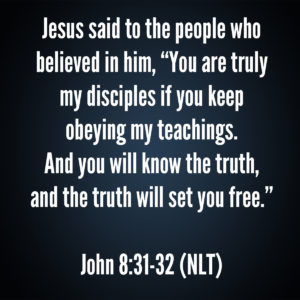
Believe it or not, the title is an important question because what we believe about how God responds or doesn’t respond to our actions, especially with regards to our prayers, makes all the difference in the world. Prayer is the most vital link we have with God because scripture reveals, in general, the mind and will of God for the believer but it is prayer that creates and develops the relational side of our relationship.
I have read many books on prayer and half of them say that God only intends to change us when we pray and that the will of God has already predetermined what he will or will not do in any given instance. If we believe that God does not change his mind on any given course of action, then prayer seems like God playing some sick game of manipulation to persuade us to obey him. If God encourages us to pray and to ask for his help to change something in our lives while never intending to do what we ask for, then at worst he is lying and at best he is manipulating.
This question will be a multi part discussion because it is one of the most complicated and distorted topics in theology. It is especially important in my view because it deals directly and indirectly with the character of God. It revolves around whether we should trust God. Our friendship and relationship with God should be built on trustworthiness. The question is how close should we get to God and can we consider each other friends in the truest sense of the word? Remember, I started out talking about prayer and God’s respond to our requests for change. So, is prayer just an exercise in manipulation or coercion? The character of God revolves around his truthfulness.
A few passages of scripture say up front that God will respond to our prayers as long as we ask in faith and walk in humility. This is one of the most famously quoted bible passages around the world and is used to motivate moral, civil and spiritual renewal.
2 Chronicles 7:14-15
“if My people who are called by My name will humble themselves, and pray and seek My face, and turn from their wicked ways, then I will hear from heaven, and will forgive their sin and heal their land. 15“Now My eyes will be open and My ears attentive to prayer made in this place.
This passage gives us specific instruction on how and why God answers our prayer. This was given to King Solomon, David’s son, when he was seeking God to move on Israel’s behalf if they prayed. Now, a few things need to be considered when we ask God to do something for us. The first is that we need to be in a relationship with him. The “IF MY PEOPLE” sets the stage for answered prayer. I can’t tell you how many people have tried to pray when they are in trouble but they have no real relationship with God. The old saying that there are no “Atheists” in fox holes during war time comes to mind when people only pray when they are in trouble but care little for the things of God in the good times. Trouble humbles us to seek out help greater than ourselves but relationship is often the deciding factor, not our crying or pleading.
God is, in this instance, setting the “Ground Rules” for answered prayer and it is a pretty solid requirement. Secondly, God says humility is also needed for answered prayer. Humility is admitting we don’t know it all and can’t change everything. Consequently, we are in need of God’s guidance and assistance. How often have we heard people pray their shopping list of prayer needs with no or little humility? I think far more than we care to admit and if we examine our own prayer time we need to ask the same question. Do I pray with humility or do I pray like the tax collector verses the Pharisee?
Luke 18:9-10
Also He spoke this parable to some who trusted in themselves that they were righteous, and despised others: 10“Two men went up to the temple to pray, one a Pharisee and the other a tax collector.
To summarize, relationship, humility and prayer sets up the possibility to receive change from God. God practically defines himself as possibly being ready to both change his mind about our circumstance and changing his investment in us by potentially granting our request.
How can teachers of the word of God deny that God changes his mind when reading such passage? It is purely because they are guided by their doctrine when interpreting who God is and what he does. Instead of looking at the broad spectrum of scripture, which shows God’s intentions on prayer and his desire to intervene on our behalf, these teachers kill our motivation to seek God’s help by telling us “God Does Not Change“. It is easy to build your spiritual life with what Jesus called “Blind Guides“, rather than the truth of scripture. Theologians, teachers and pastors should know better because they study scripture but they become indoctrinated by people who explain God’s word through lying spirits and become blinded by someone else’s ideas, which they learned in seminary or church.
Take, for instance, the story of King Hezekiah in 2 Kings. He gets a word from God, through the prophet Isaiah, that he is going to die. So, he is instructed to get his house in order before he dies, which is imminent. It seems that he was sick and the prophet revealed it to be fatal. The question is whether God ordains everything that happens to us or can he change his mind according to what we do or request in prayer? Shouldn’t Hezekiah just submit to the word of the Lord or should he pray and ask for God to change his mind?
2 Kings 20:1
In those days Hezekiah was sick and near death. And Isaiah the prophet, the son of Amoz, went to him and said to him, “Thus says the LORD: ‘Set your house in order, for you shall die, and not live.’”
Hezekiah seems to believe that if he prays with great earnestness that God “MIGHT” change his mind. He does pray and God changed his mind and changed this prophetic declaration. God sent Isaiah back to him and told him the opposite of the word he just delivered; that he would NOT die but would be healed and would get an add 15 years to his life. Wow! It appears prayer can change God’s mind depending on who we are and how we have lived.
When a person believes their prayer can change the heart and mind of God, amazing things can happen. Scripture is full of examples to back up this claim. Conversely, if a person believes everything that happens in life is God’s will because God has already predetermined a course of action in eternity, then the incentive to pray is undermined and people blame God for not caring.
A change of mind for a king and for a people. (Also see 2 Kings 22:19) It is interesting that God used a medicinal tactic to heal Hezekiah, a natural application with figs applied to the boil, and then he recovered. God even caused the natural world, possibly the rotation of the earth, to be affected because the shadow went back 10 steps on the stairway at Hezekiah’s request!
Hezekiah seems to waste the 15 years God gave him and does something extremely foolish by putting everything God had blessed him with at risk by showing a visiting dignitary all his wealth. He probably did so to boast to people who were coming to flatter him. He opened up and displayed what he had in his storehouse to the enemy posing as a friend. Our blessing from prayer is no guarantee we will use them wisely.
The prophet Isaiah asked the king what he did with these visitors because he suspected the king had acted foolishly. The king responded that he showed them everything. Isaiah said that he will now lose everything, including some of your descendants who will be carried off as slaves to become eunuchs in Babylon.
Hezekiah did great things during his life time and was an amazing innovator. He brought water into the city, had pools and aqueducts that were amazing and yet he squandered God’s blessing. His son Manasseh succeeded him and did more evil than any other king in Judah. He rebuilt the high places his father had destroyed and worshiped pagan gods, even in the temple in Jerusalem. He even sacrificed his own son in the fire and consulted mediums and spiritualists.
I have just scratched the surface on whether or not God changes his mind because we pray and I hope you will do your own investigation of scripture to be convinced that God wants to not only hear our prayers but move on our behalf as well.
The next article in this series will address how the doctrine of God being “UNCHANGEABLE” was created, as well as more accounts of people praying and God moving.
Questions:
1) Do you believe that you would bother to pray if your prayers didn’t change anything? (Ps 20:1-4 & 7)
2) Is your relationship with God one that you can trust for help in the time of need or one that seems distant? (Jeremiah 33:3)
Seeking the God of the Bible and his awesome power,
Pastor Dale




Very thought prrovoking!
Hi Sue – There will be 3-4 parts to this so stay tuned
I believe that prayer has the ability to change our circumstances and outcomes for not only ourselves but for others (note scripture below). I have a recent testimony concerning a surprising and wonderful change of events for a family member that can only be explained by the intervention of God.
When we say that God moves on our behalf, don’t we really mean that because of our prayer and based on relationship, God will take an action that would have not happened? If we don’t believe this then haven’t we lost the concept of supernatural intervention? While I also believe that God changes me through prayer, I do believe that prayer can change outcomes. If God is sovereign and in control, this argument can only conclude that God can change His mind.
Love you Pastor!
Abraham Negotiates with God
23 Abraham approached and asked, “Will you actually destroy the righteous along with the wicked? 24 Perhaps there are 50 righteous ones within the city. Will you actually destroy it and not forgive the place for the sake of the 50 righteous that are found there? 25 Far be it from you to do such a thing—to kill the righteous along with the wicked, so that the righteous and the wicked are treated alike! The Judge of all the earth will do what is right, won’t he?”
Hi Jason
Great observation and perspective.